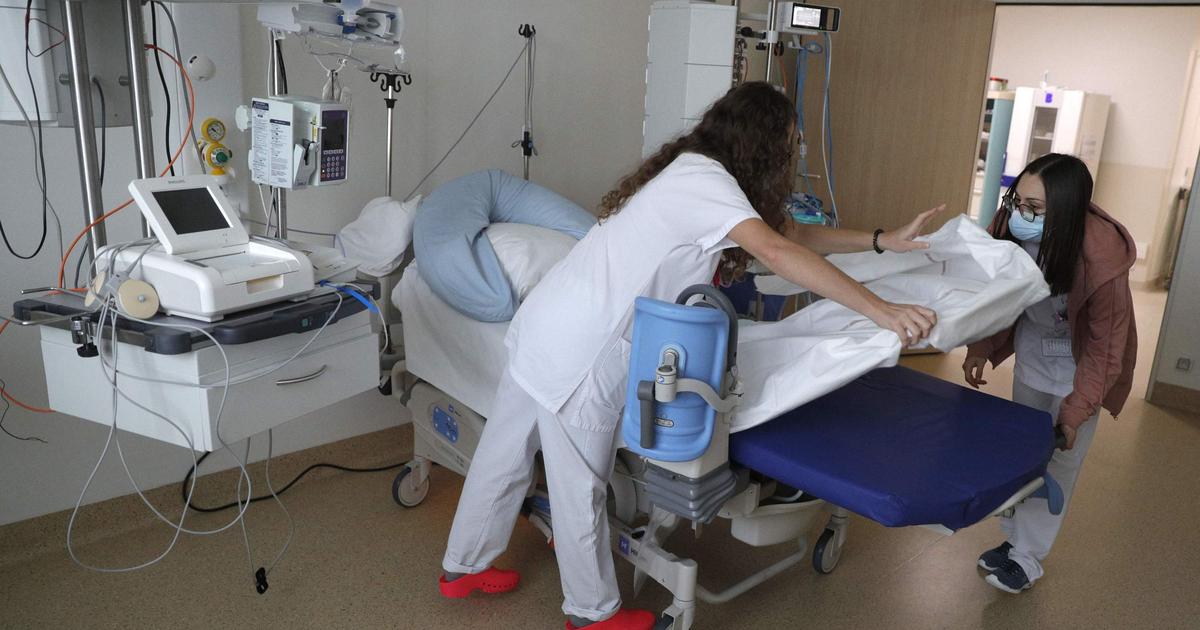Hello,
There was an air of spring this week and not only thanks to the weather.
The government spokesperson mentioned the possibility of lifting the vaccination pass at the
end of March or the beginning of April
if all the conditions are met.
Some countries have already taken the gamble of removing it despite the circulation of the virus.
A welcome perspective as a new mobilization tries to organize itself in the form of a
“freedom convoy”
coming straight from Canada.
All this, however, does not slow down the
Pfizer
laboratory , which is posting record results.
Finally, vigilance is still required in the face of the increased risk of
cardiovascular disease
after a Covid infection.
Good reading,
Camille Lestienne, journalist at Le Figaro
1. A spring without a vaccination pass?
The vaccination pass could be canceled at the end of March, beginning of April.
ERIC GAILLARD / REUTERS
Late March, early April?
The government spokesman estimated Wednesday, at the end of the Council of Ministers, that there are "
reasons to hope
" that " at the
end of March, beginning of April we can lift the vaccine pass
", due to the improvement of the health situation.
Earlier in the day, Alain Fischer, President of the Vaccine Strategy Orientation Council, had mentioned the same deadline to the Senate if a series of conditions were met: an incidence rate reduced by 10 or 20 times less ( we are at 2500), the disappearance of hospital overload and high vaccination coverage.
The figures to remember in France
3,503
patients in critical care (-52 since the day before)
32,878
hospitalized patients (-474 since the day before)
235,267
new cases detected (compared to 416,896 a week ago)
255
deaths in 24 hours in hospital (133,869 dead since the start of the epidemic)
Source: Public Health France as of February 9, February 8 for the number of cases
New protocol at school.
Regarding the protocol at school, “
there will be announcements by the end of the week, I hope from Friday February 11
”, also announced Gabriel Attal.
A first meeting was held on Tuesday between Minister Jean-Michel Blanquer and the unions.
An opinion from the High Council for Public Health (HAS) is expected this Thursday.
In the meantime, several avenues are mentioned, in particular the end of the mask outdoors, the alleviation of constraints on sports practice, on the mixing of students and on the number of tests.
Abroad.
Some countries have already chosen to abolish the vaccination or health pass.
This is the case of the Czech Republic which on Wednesday ended the obligation to present it to enter restaurants, cultural and sporting events.
Israel did the same last Sunday and Switzerland is considering it for February 17.
In England, where most restrictions have been lifted, Boris Johnson is going even further and hopes to abandon the isolation of positive cases by the end of February.
Read alsoCovid-19: these absurd situations that may arise on your travels
2. A convoy against the past
Opponents of the vaccine pass would like to import the Canadian “freedom convoy” to France.
ERIC GAILLARD / REUTERS
On the way to Paris
.
The evocation of the end of the pass does not stop them.
On Wednesday, the first participants in the “freedom convoy” left Nice, Perpignan or Bayonne.
Joined by other columns of vehicles from several cities, they plan to reach Paris this Friday.
On the model of Canadian truckers mobilized against compulsory vaccination and blocking downtown Ottawa, various groups born on Facebook thus intend to protest against the vaccination pass.
Their demands are however broader and could be assimilated to those of the "yellow vests".
Although disorganized, the movement is carefully followed by the police.
This Thursday morning, the Paris police headquarters banned the demonstration.
"
A specific device will be put in place (...) to prevent the blocking of roads, verbalize and challenge offenders of this ban
, ”she added in a press release.
Read alsoCovid-19: the revolt of the “truckers” rumbles in Canada
3. Record results for Pfizer
Paxlovid, Pfizer's antiviral treatment, is expected to generate $22 billion in revenue in 2022. JENNIFER LORENZINI / REUTERS
Pfizer is doing well
.
With a turnover doubled, to 81.3 billion dollars, and a net result of 22 billion, the year 2021 is exceptional for the American laboratory.
Pfizer plans to cross the milestone of 100 billion dollars in turnover in 2022, including 54 billion linked to Covid.
As for Paxlovid, the antiviral treatment, it should generate 22 billion dollars in revenue.
However, the question of the effectiveness of vaccines against Sars-CoV-2 is brought back to the fore with the record death figures in Israel.
And yet, if the country is a pioneer in vaccination, 28% of its population is still not vaccinated and forms the majority of deaths and serious cases.
What about side effects in children?
While the vaccination of children under 12 is slipping, the first feedback from the pharmacological monitoring networks in France is reassuring.
Out of 244,000 doses administered, only 44 cases of adverse effects, two of which were serious with a favorable outcome, were reported.
These figures support US data that the vaccine shows fewer serious adverse event reports for children than for adults.
The French Society of Pediatrics is about to republish a press release encouraging children to be vaccinated.
Read alsoCovid vaccine: is it possible that Pfizer has a disclaimer?
Vaccination figures
54.1 million
people received a first dose (80.3% of the population).
54 million
French people have a complete vaccination schedule (78.6% of the population).
37.1 million
booster doses administered.
Source: Ministry of Health as of February 9
4. The risks of long Covid
There is an increased risk of cardiovascular disease in unvaccinated people who have had Covid within the year.
ipopba / stock.adobe.com
Cardiovascular illnesses.
We know more about the long-term effects of Covid.
According to an American study, there is an excess risk of cardiovascular disease in unvaccinated people who have had Covid during the year, including in a moderate form.
In detail, the risk of stroke increases by 50% at one year, the risk of arrhythmias by 70%, the risk of heart failure by 72% and the risk of pulmonary embolism by 193%.
The probability of seeing these diseases appear increases, however, according to the severity of the Covid developed and in particular in patients who have been hospitalized.
Sars-CoV-2 would penetrate heart cells to destroy them and could also create lesions on the arteries.
5. Calendar, pass and masks
Calendar.
On January 20, the government announced a timetable for the gradual lifting of restrictions.
February 2
: end of compulsory teleworking, gauges and wearing a mask outdoors.
February 16:
reopening of nightclubs and reduced protocol in bars, stadiums, cinemas and transport.
Vaccination pass.
Since January 24, the vaccination pass is required for people over 16 to go to places of leisure, restaurants and drinking establishments (with the exception of collective catering), fairs, seminars and trade shows. and inter-regional public transport (planes, trains, coaches) unless there is a compelling reason.
The health pass remains valid for minors aged 12 to 15 and for access to health establishments and medico-social services.
The vaccination pass is activated by proof of complete vaccination or a certificate of recovery stored in the TousAntiCovid application or in paper format.
Read alsoDates, places, people concerned … What changes this Monday with the vaccine pass
Wearing a mask
is compulsory in closed places subject to the vaccination pass.
It is no longer imposed on the outside.
The mask is still compulsory in primary schools both outside and inside.
Since February 9, it is no longer mandatory in chairlifts and ski lifts but still required in gondolas and queues.
A certificate to travel.
Since July 1, 2021, Europeans can travel more easily within the continent thanks to certified proof of vaccination or negative tests gathered in a single document.
In digital or paper format.
Please note, however, that each country may continue to apply specific rules.
Read alsoWhere can we travel?
Our map of open countries and restrictions for French tourists
6. The reflexes to keep
The virus is transmitted by droplets and aerosols.
The barrier gestures detailed by the Ministry of Health must be observed to protect themselves and others:
Wash your hands regularly or use hydroalcoholic gel
Cough or sneeze into the crease of your elbow
Use single-use tissues
Wear a mask in public spaces when the distance of two meters cannot be respected
Avoid touching your face
Air the rooms as often as possible, at least a few minutes every hour
Greet without shaking hands and stop kissing
7. What to do in case of symptoms?
The disease is most often manifested by cough, fever or feeling feverish, loss of smell and taste, fatigue.
If after a few days, you have trouble breathing or are short of breath, you should contact 15. The symptoms would be lighter with the Omicron variant, similar to those of a cold: sore throat, headache, runny nasal.
Read alsoCovid-19: what to do when you are a “contact case”?
In case of signs of the disease, the most important thing is to get tested.
The test, PCR or antigen, remains free for those who have not been vaccinated on medical prescription or after having been identified as a contact case by Health Insurance.
In the event of a positive result on a self-test, a confirmation PCR test is recommended.
While waiting for the result, you must isolate yourself, wear a mask and prepare the list of people you could have infected.
In the event that the test is positive,
isolation must last 7 days
from the first symptoms for vaccinated people,
10 days
for unvaccinated people.
It can be broken on D+5 or D+7 respectively, if you have a negative test and you have had no symptoms for 48 hours.
Read alsoYou have just learned that you are positive for Covid-19, what to do?
See you next week.














